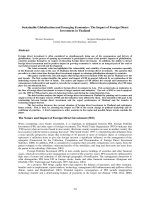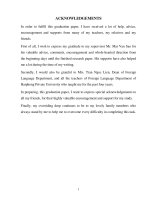A Certain Je Ne Sais Quoi: The Origin of Foreign Words Used in English
Bạn đang xem bản rút gọn của tài liệu. Xem và tải ngay bản đầy đủ của tài liệu tại đây (2.47 MB, 199 trang )
TableofContents
TitlePage
Acknowledgements
CopyrightPage
Epigraph
Introduction
A
B
C
D
E
F
G
H
I
J
K
L
M
N
O
P
Q
R
S
T
U
V
W
Y
Z
Abrieflistofsources
ACKNOWLEDGMENTS
TheauthorwishestothankMattHibberd,JohnRhodes,CassieKite,Kerry
Chapple,andLindsayDavies.ThanksalsotoDanCrompton,LiriosPla-Miro,
SarahRustin,JennyFry,JamieBuchan,RowenaAnketell,andallthelinguists
atMichaelO’Marafortheirgeneroushelp.
AREADER’SDIGESTBOOK
Copyright©2010MichaelO’MaraBooksLimited
Allrightsreserved.Unauthorizedreproduction,inanymanner,isprohibited.
Reader’sDigestisaregisteredtrademarkofTheReader’sDigestAssociation,Inc.
FirstpublishedinGreatBritainin2009byMichaelO’MaraBooksLimited,
9LionYard,TremadocRoad,LondonSW47NQ
READER’SDIGESTTRADEPUBLISHING
ConsultingEditor:CandaceLevy
EditorialIntern:LaurenHanson
Manager,EnglishBookEditorial,Reader’sDigestCanada:PamelaJohnson
SeniorArtDirector:GeorgeMcKeon
ExecutiveEditor,TradePublishing:DoloresYork
ManufacturingManager:ElizabethDinda
AssociatePublisher,TradePublishing:RosanneMcManus
PresidentandPublisher,TradePublishing:HaroldClarke
LibraryofCongressCataloging-in-PublicationData
Rhodes,Chloe.Acertain“jenesaisquoi”:theoriginofforeignwordsusedinEnglish
ChloeRhodes.
p.cm.
eISBN:978-1-606-52276-9
Englishlanguage—Foreignwords—Dictionaries.2.Englishlanguage—
Etymology—Dictionaries.I.Title.
PE1670.R4 952010
4 22’.4 03--dc22
200904 8817
Reader’sDigestiscommittedtoboththequalityofourproductsandtheserviceweprovidetoour
customers.Wevalueyourcomments,sopleasefeelfreetocontactus:TheReader’sDigestAssociation,
Inc.,AdultTradePublishingReader’sDigestRoad,Pleasantville,NY10570-7000
FormoreReader’sDigestproductsandinformation,visitourwebsite:
www.rd.com(intheUnitedStates)
www.readersdigest.ca(inCanada)
“Theyhavebeenatagreatfeastoflanguages,andstolenthescraps.”
—WilliamShakespeare,Love’sLabour’sLost,V.i
Introduction
The wonderful thing about words is that once we’ve learned their meanings,
werarelyhavetogivethemasecondthought.Whetherwe’rearguingapoint,
expressing our passion, or simply ordering a pizza, the words are there;
generally we have no need to pause to consider their precise meanings or
ponderovertheirprovenance.
However, for all the benefits such fluency brings, it does mean that we’re
often oblivious to the fascinating origins of the words and phrases we use
everyday,whichiswhythisbookcametobe.Thelistofwordsandphrases
within it is by no means exhaustive, and it doesn’t offer an academic look at
etymology, but it does attempt to tell the stories of some of the thousands of
foreignwordsandphrasesthathavecometobecommonlyusedinEnglish.
Thattherearesomanyshouldcomeasnosurprise;Englishspeakershave
been linguistic magpies since at least the fifth century, when the dialects of
Anglo-Saxon settlers, Celts, and Norse invaders were cobbled together to
create OldEnglish.When theNormansarrivedin1066,itmusthaveseemed
only natural to appropriate some of their vocabulary, too; by the end of the
thirteenth century, more than 10,000 French words had been absorbed into
English, 75 percent of which we continue to use today. The Norman
conquerors also shared with us a fondness for Latin, both ancient Gaul and
BritainhavingbeeninvadedbytheRomansin58BCandAD43respectively,
andafewcenturieslatertheEuropeanRenaissancebroughtLatinandancient
Greektotheforeoncemore.
As the British Empire grew from the late sixteenth to the early twentieth
centuries, marauding seafarers filled their boats not only with strange Asian
spices and exotic fabrics but also with words for all the new foods, animals,
anditemsofclothingtheyhadseen.InNorthAmerica,meanwhile,Englishwas
toreceiveitsmostvigorousboostyet.WordsfromItaly,Spain(viaMexico),
Poland,Germany,andeasternEuropeweresoonspillingfromtheimmigrant
shipstobemoppedupbythegiantlexicalspongeofAmericanEnglish.
Veryoftenthenewtermshadnopracticalpurpose—Englishspeakersdidn’t
goaroundgobblingupforeignwordsbecausetheywereshortoftheirown—
theydiditbecause,whereself-expressionisconcerned,youcanneverhavetoo
manyoptions.Veryoftenthereisjustsomethingaboutthrowinginaforeign
wordorphrasethatlendswhateverwehavetosay,well—howbesttoputit?—
acertainjenesaisquoi.
ANotefromthePublisher
The convention in written English is to place unfamiliar foreign terms, or
relatively newly acquired ones, in italics. Opinions differ as to when a word
hasbeensofullyabsorbedintoEnglishthatitnolongerneedsitalics,butour
vade mecums (see page 165) have been the eminently reliable New Oxford
DictionaryforWritersandEditorsandNewOxfordSpellingDictionary.
A
Acappella
inthemannerofthechapelorchoir(Italian,fromtheLatin“acappella”)
This phrase comes to us via the Late Latin “cappa,” meaning “cap” or
“cloak”—thechapelthathousedthecloakofSaintMartin,keptasarelic,was
thusthe“capella.”Themeaningofthetermhasnowexpandedtoincludeany
unaccompanied vocal performance, from the doo-wop bands of 1950s
AmericatobarbershopquartetstomodernTVtalentshows.
The neighborhood dogs all howled along when Jeremy began his a
cappellaserenade.
Alacarte
accordingtothemenu(French)
An “à la carte” menu features individually priced items as opposed to a setprice menu. The concept was introduced by celebrated French chef Georges
AugusteEscoffierduringhistenureattheCarltonHotelinLondonattheturn
of the last century. Escoffier ’s 1903 cookbook Le Guide Culinaire is still
reveredasaculinarybible,thoughhisgreatestclaimtofameisthatoneofhis
pupils was Ho Chi Minh, who presumably thought he’d better get a bit of
pastrypracticeunderhisbeltbeforeleadingVietnamtoindependence.
’t’llhavetobetheàlacartemenuforme;I’vegotaterriblecravingfor
truffles.
Alamode
fashionable(French)
The link between France and fashion was established by King Louis XIV,
whosecourtbecamesuchanepicenterofgoodtastethattheBritisharistocracy
didn’tsimplywanttodressinFrenchfashion,theywantedtheirphraseforit,
too.Intheseventeenthcenturythetermwasanglicizedtobecome“alamode”—
alightsilkusedtomakescarves.IntheUnitedStatesthephrasehasalsocome
tomean“withicecream”;theremusthavebeenatimeinsmall-townAmerica
when the combined flavors of cooked apple, sweet pastry, and vanilla
representedtheverylatestinfashionable,cutting-edgegastronomy.
Can I suggest these divine little ankle boots, madam? Python-skin
platformsaresoàlamode.
Apriori
fromwhatprecedes(Latin)
In philosophical debate, “a priori” knowledge is a form of knowledge that
comes from what we know rationally to be true, without having to test or
researchit.Itsoppositeis“aposteriori”knowledge,whichisgleanedthrough
experimentation or experience. The great eighteenth-century German
philosopherImmanuelKantinitiatedthemodernuseofthetermandbelieved
that a priori knowledge was transcendental, stemming from an individual’s
cognitivefaculties.Inmoregeneraltermsitisusedliterallyorironicallyfor
any argument or idea that is based on inherent knowledge rather than
observation.
WeknowapriorithatTomwon’tsaynotosomekindofdinner;itdoesn’t
matterwhatweget,thatboywilleatanything.
Adhoc
forthis(Latin)
This is one of many politically, administratively, and commercially useful
termstohaveretaineditsLatinform.Itmeanssomethingthatisdesignedfor
one set purpose. “Ad hoc” committees are established by the government to
helpsolveaspecificproblem;they’reusuallycreatedinresponsetoanurgent
needandlastonlyforthedurationofthetaskinhand.Thishasledthephrase
tohaveabroadermeaningofimprovisedorprovisional.Forexample,ifplans
aresaidtobe“adhoc,”theymightbeseenaslastminuteandhaphazard.
Jeffrey preferred to plan his plane-spotting trips for himself; the
itinerariesofhisfellowenthusiastsseemedalarminglyadhoc.
Adlib
accordingtoone’spleasure(Latin,from“adlibitum”)
Thiswasoriginallyusedtomarkoutthepointswithinapieceofsheetmusic
ortheatricalscriptwhereperformerscouldaddtheirownpersonalflourish.In
moderntimesthephraseismostoftenusedtodescribetheunscripted,off-thecuff comments that comedians, actors, or presenters add to their scripted
material, either to get an extra laugh or to conceal the fact that they have
forgottentheirlines.
Oh,darlings,thatwasawful!Thewordsjustwentrightoutofmyhead;I
hadtoadlibmywaythroughthedeathscene.
Adnauseam
tosickness(Latin)
An“argumentumadnauseam”isanargumentthatisrepeateduntileveryoneis
sickofhearingit.Muchofthelanguageofdebatecomesfromtheadversarial
conventionsestablishedbyRomanoratorCicerointhefirstcenturyBC.“Ad
nauseam”hasbeenusedinEnglishsincetheearly1600sandisstillemployed
to pour scorn on a well-rehearsed political argument. It’s also used in
reference to other annoyingly repetitive things, like people who recite lines
fromtheirfavoriteTVcomedyuntilyouwanttotearyourearsoff.
Late again, Brian. Don’t try to explain. I’ve heard your excuses ad
nauseam.
Aficionado
ardentfanordevotee(Spanish)
InSpain“aficionado”isusedmostfrequentlytodescribefansofbullfighting.
Ernest Hemingway was a famous one; “Aficion means passion,” says his
narrator, Jake Barnes, in The Sun Also Rises. In English the term indicates a
devotedfanofasportorartformthatevokesstrong,primalfeelings.There
arejazz,opera,rugby,andballetaficionados,butyou’reunlikelytohearthe
term applied to badminton fans, no matter how potent their ardor for the
perfectdrop-volley.
Sid“TheSavage”Simmonslivedinfearofbeingoutedasafigure-skating
aficionado; he’d been smitten since he saw Torville and Dean dance to
Ravel’sBoléro.
Agentprovocateur
incitingagent(French)
Asecretagentemployedbythepoliceorgovernmenttoencouragecriminals
or dissidents to break the law so that they can be arrested. The phrase is still
usedinthisway;intheUnitedStatestheFBIhasusedagentsprovocateursto
infiltrateradicalpoliticalgroupsliketheBlackPanthersandtheKuKluxKlan,
and in the UK it’s the name of a risqué lingerie firm that hopes to incite bad
behaviorofadifferentkind—oohlala!
Agent Peters, we need you in there as an agent provocateur. Your
undercovernamewillbe“TheStrangler.”
Agitprop
agitationandpropaganda(Russian,from“agitatsiiipropagandy”)
The Agitation and Propaganda section of the Communist Party’s Central
Committee was responsible for the education of the people after the 1917
Revolution.Itusedspeeches,radiobroadcasts,posters,film,andvisualartto
influence public opinion, though in Soviet Russia at that time there was no
negative connotation to the word “propaganda.” In modern Western usage it
usually refers to political propaganda, especially of dissident or protesting
groups, but also works of art and literature whose aim is to indoctrinate its
audiencewithextremeleftistideology.
Frederick feigned illness on the night of the Socialist Amateur Dramatic
Society’smonthlywineandpoetryevening.He’dhadhisfillofagitpropat
thelastone.
Aide-mémoire
memoryaid(French)
Earlyuseofthephrase,whichmeansa“note”or“memorandum,”waslimited
tomilitaryanddiplomaticfields.G.Lewis’s1846bookAide-Mémoire to the
MilitaryScienceswasoneofthefirstwrittenreferences toit.In morerecent
timesithasalsocometorefertoamemory-joggingsymbol,likeaknottiedin
ahandkerchief,oramnemonicdevice,liketherhyme“ibeforeeexceptafter
c.”
Mr.Green’sscowlwasputtingoffthevoters,sohispoliticaladvisersdrew
smileyfacesoneachpageofhisspeechasanaide-mémoiretolookmore
cheerful.
Aldente
tothetooth(Italian)
This is the term Italians use to describe the way pasta should be served—
cookedthroughbutstillfirm,retainingsomebite.Theenormouspopularityof
ItalianfoodintheUKandtheUnitedStateshasledthephrasetobewidelyused
inEnglish.Ithasalsobeenadoptedtodescribevegetableslikegreenbeansand
zucchini,whichhavebeencookedbrieflysotheyretainabitofcrunch.
The craze for al dente vegetables hadn’t really caught on at Mrs.
Higginson’s guesthouse: her greens were so well cooked you had to eat
themwithaspoon.
Alfresco
inthefresh(Italian)
In English we use the phrase to mean “in the fresh air,” but to Italians it’s a
slang term for “in prison,” like the English phrase “in the cooler.” To avoid
confusion when visiting Italy, ask for a table “all’aperto,” meaning “in the
open,”ifyouwanttodine,um,alfresco.ThephrasehasbeenusedinEnglish
since at least the eighteenth century—the picnic at Box Hill in Jane Austen’s
Emmaisdescribedasan“al-frescoparty.”
I’drathernoteatalfrescoagain;lastnightIlosthalfmyspaghettitoa
seagull.
Algebra
reunion,restoration(Latin,fromArabical-jabr)
Ninth-century Persian mathematician Muhammad bin Musa al-Khawarizmi
firstusedthetermtodescribethemethodsbywhichlettersandothersymbols
areusedtorepresentnumbersandquantitiesinequationsandformulas.Infact,
the romanized version was first used in English in reference to reuniting
broken bones. In the twelfth century a Latin translation of al-Khawarizmi’s
workwaspublished,andwehaveused“algebra”asamathematicaltermever
since.
Sarah had found a pleasing way to practice the balancing principles of
algebra—every time she ate one of her own sweets, she ate one of her
brother’s,too.
Almamater
nourishingmother(Latin)
Your “alma mater” is your university or school. The phrase was originally
usedbytheRomansasatitleforgoddessesandbyearlyChristianstodescribe
the Virgin Mary. “Alma mater studorum,” which translates as “nourishing
mother of studies” was the motto of the University of Bologna in Italy—the
oldestuniversityintheworld—anditmayhavebeenthroughthisassociation
thatthetermcametorefertoplacesofeducation.Itsmeaninghasextendedin
theUnitedStatestomeantheschoolsongoranthem.
Boriscouldbarelycontainhisexcitementonthewaytothereunionathis
almamater.TenyearshadpassedsincehisfailedattempttowooTiffany
Plumbings,andhefeltreadytogiveitanothergo.
Alterego
otherself(Latin)
Thephrase,inthesenseofasecondselforalternativepersona,wasfirstused
inreferencetoschizophreniaintheearlynineteenthcentury.Itisnowalsoused
torefertoanumberofmorebenigndoubleidentities,fromcross-dressersto
authorswhosecharactersarefictionalizedversionsofthemselves.Analterego
hasevenbecomeafashionableaccessoryinthemusicbusiness.DavidBowie
started it with Ziggy Stardust: Britney Spears, Mariah Carey and Beyoncé
Knowleseachhaveone,andPrincehastwo.
Barryinaccountsseemedlikesuchamild-manneredandsteadyman,and
yet the rumor was that he had an alter ego—Rosalita Lamé—and
performedatthelocalcabaretclubeveryotherFriday.
Amok/amuck,torun
furiousattack(Malay)
The word comes from the Malay description of a psychiatric disturbance, in
which the sufferer is first subdued or even depressed before suddenly
becomingwild,maniacal,andusuallyviolenttowardothers.Itisstillusedto
describetheconditionofpeoplewhocommitasudden,unprovokedattack,but
it has also developed a colloquial meaning. When people are said to be
“running amok”—like rioters, for example—they are acting wildly and
withoutrationalself-control.
Police had to be called to a major department store sale today after
shoppersranamokinthetoydepartment.
Amuse-bouche
mouthamuser(French)
Something to tickle the taste buds before the arrival of a starter, an “amusebouche”willneverappearonamenu,asitiscomplimentaryandchosenbythe
chef. The concept of a bite-size taster of the chef’s signature style was
introduced as part of the nouvelle cuisine movement, which specializes in
offeringsmall,beautifullypresentedandintenselyflavoredcourses.InFrance
the colloquial phrase “amuse-gueule” (“gueule” being slang for “mouth”) is
moreoftenused.
Tonight, mademoiselle, we have a speciality of roasted sea bass in a
tarragonjusandtobegin,anamuse-boucheofgreenpeaandmintsorbet
inacrispParmesantuile.
Angst
fear(German)
Angstisgenerallytranslatedsimplyas“fear,”butitisoftenusedtodescribea
profound horror, or existential dread, as coined by German philosophers in
the mid-1800s. English novelist George Eliot wrote of “Die Angst,” which
brought on a pain in the heart, and the word became more widespread in
EnglishafterthetranslationofAustrianpsychologistSigmundFreud’swork.
The 1980s saw the birth of teen angst—based on the sense of injustice and
futility that comes with raging hormones, and you can now regularly find
sports fans and businesspeople “angsting” over match results and corporate
deals.
I’ve never known anything to cause as much angst as this week’s
unemploymentnumbers.
Annushorribilis
horribleyear(Latin)
Apunon“annusmirabilis,”whichdescribedayearofBritishvictoriesinthe
eighteenthcentury,thisphrasewasfirstusedinQueenElizabeth’sspeechatthe
end of 2002. Her year had been marred by the breakdown of three royal
marriages and a devastating fire at Windsor Castle. Two years later Kofi
Annan,thentheUNsecretary-general,repeatedthephrasetodescribeayearin
which the UN’s Iraq “Oil for Food” program had been tainted by charges of
corruption.Itisnowusedwidelytodescribeabadyear.
Withthehighestrainfallonrecordthisreallyhasbeenanannushorribilis
forfansofbeachvolleyball.









